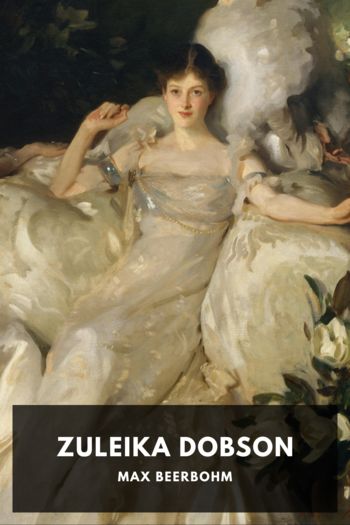Zuleika Dobson - Max Beerbohm (good e books to read txt) 📗

- Author: Max Beerbohm
Book online «Zuleika Dobson - Max Beerbohm (good e books to read txt) 📗». Author Max Beerbohm
At the word “See” he had stretched one hand towards Nellie; the other he had laid on his heart, where it seemed to encounter some sort of hard obstruction. This he vaguely fingered, wondering what it might be, while he gave his order to Barrett. With a sudden cry he dipped his hand into his breast-pocket and drew forth the bottle he had borne away from Mr. Druce’s. He snatched out his watch: one o’clock!—fifteen minutes overdue. Wildly he called the waiter back. “A teaspoon, quick! No port. A wineglass and a teaspoon. And—for I don’t mind telling you, Barrett, that your mission is of an urgency beyond conjecture—take lightning for your model. Go!”
Agitation mastered him. He tried vainly to feel his pulse, well knowing that if he found it he could deduce nothing from its action. He saw himself haggard in the looking-glass. Would Barrett never come? “Every two hours”—the directions were explicit. Had he delivered himself into the gods’ hands? The eyes of Nellie O’Mora were on him compassionately; and all the eyes of his forerunners were on him in austere scorn: “See,” they seemed to be saying, “the chastisement of last night’s blasphemy.” Violently, insistently, he rang the bell.
In rushed Barrett at last. From the teaspoon into the wineglass the Duke poured the draught of salvation, and then, raising it aloft, he looked around at his forerunners and in a firm voice cried, “Gentlemen, I give you Nellie O’Mora, the fairest witch that ever was or will be.” He drained his glass, heaved the deep sigh of a double satisfaction, dismissed with a glance the wondering Barrett, and sat down.
He was glad to be able to face Nellie with a clear conscience. Her eyes were not less sad now, but it seemed to him that their sadness came of a knowledge that she would never see him again. She seemed to be saying to him “Had you lived in my day, it is you that I would have loved, not Greddon.” And he made silent answer, “Had you lived in my day, I should have been Dobson-proof.” He realised, however, that to Zuleika he owed the tenderness he now felt for Miss O’Mora. It was Zuleika that had cured him of his aseity. She it was that had made his heart a warm and negotiable thing. Yes, and that was the final cruelty. To love and be loved—this, he had come to know, was all that mattered. Yesterday, to love and die had seemed felicity enough. Now he knew that the secret, the open secret, of happiness was in mutual love—a state that needed not the fillip of death. And he had to die without having ever lived. Admiration, homage, fear, he had sown broadcast. The one woman who had loved him had turned to stone because he loved her. Death would lose much of its sting for him if there were somewhere in the world just one woman, however lowly, whose heart would be broken by his dying. What a pity Nellie O’Mora was not really extant!
Suddenly he recalled certain words lightly spoken yesterday by Zuleika. She had told him he was loved by the girl who waited on him—the daughter of his landlady. Was this so? He had seen no sign of it, had received no token of it. But, after all, how should he have seen a sign of anything in one whom he had never consciously visualised? That she had never thrust herself on his notice might mean merely that she had been well brought-up. What likelier than that the daughter of Mrs. Batch, that worthy soul, had been well brought up?
Here, at any rate, was the chance of a new element in his life, or rather in his death. Here, possibly, was a maiden to mourn him. He would lunch in his rooms.
With a farewell look at Nellie’s miniature, he took the medicine-bottle from the table, and went quickly out. The heavens had grown steadily darker and darker, the air more sulphurous and baleful. And the High had a strangely woebegone look, being all forsaken by youth, in this hour of luncheon. Even so would its look be all tomorrow, thought the Duke, and for many morrows. Well he had done what he could. He was free now to brighten a little his own last hours. He hastened on, eager to see the landlady’s daughter. He wondered what she was like, and whether she really loved him.
As he threw open the door of his sitting-room, he was aware of a rustle, a rush, a cry. In another instant, he was aware of Zuleika Dobson at his feet, at his knees, clasping him to her, sobbing, laughing, sobbing.
XVIFor what happened a few moments later you must not blame him. Some measure of force was the only way out of an impossible situation. It was in vain that he commanded the young lady to let go: she did but cling the closer. It was in vain that he tried to disentangle himself of her by standing first on one foot, then on the other, and veering sharply on his heel: she did but sway as though hinged to him. He had no choice but to grasp her by the wrists, cast her aside, and step clear of her into the room.
Her hat, gauzily basking with a pair of long white gloves on one of his armchairs, proclaimed that she had come to stay.
Nor did she rise. Propped on one elbow, with heaving bosom and parted lips, she





Comments (0)